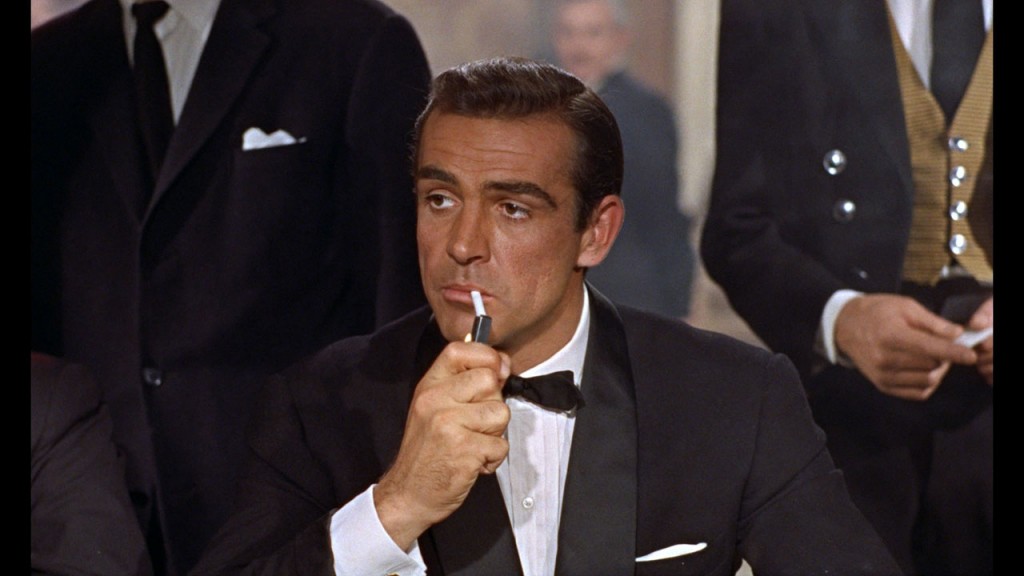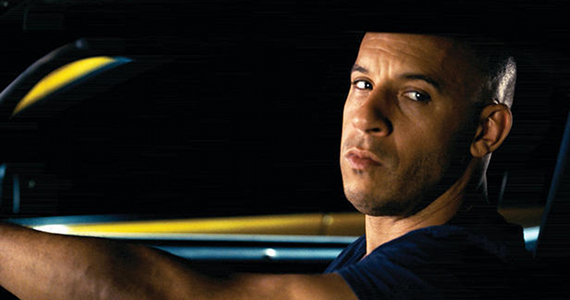Some thoughts on Furious 7
In 1962, Sean Connery starred as James Bond in Dr. No. This was not the first appearance of James Bond. The character had been around for nine years before that, in the novels by Ian Fleming of course, but had also showed up in both a TV adaptation and, of all things, a newspaper comic. But after Dr. No, Bond was everywhere. Connery’s performance lodged in people’s minds and by the time Goldfinger came out the character had become an immortal icon, a symbol.
But a symbol of what? As a child, I had no idea what the heck James Bond was “about.” The movies seemed to drag. They weren’t thrillers or dramas, they were light-comic pageants, devoid of suspense or surprise. Nothing of import seemed to happen in them. It wasn’t until later that I identified James Bond as a symptom of cold-war “lifestyle marketing,” related more closely to Playboy and Esquire than the espionage thrillers they purported to be. Bond was a hollow man, a collection of attitudes. A tuxedo, a gun, cool toys and a limitless supply of ladies.
As a character, James Bond is a non-starter: there’s no there there. And intentionally so. His only desire is to drink, gamble and get laid — in high style. He’s a fantasy, but an extremely potent one: he has no home, no family, no connections. He was drinking all the booze and scoring all the chicks for all the men of the world who were tied down in their post-war homes, building their families and toiling in 9-to-5 jobs in the longest economic boom in American history.
Bond’s rootlessness connects him to a long line of masculine heroes, men who have no past or future, who emerge from the mist and vanish again when their need has been fulfilled. Bond isn’t that far the restless cowboy of the western, from Wayne to Eastwood, who wanders the West without roots or home. But unlike Shane or Ethan Edwards or The Man With No Name, James Bond isn’t haunted or troubled by his rootlessness. He loves his aimless lifestyle, his non-stop parade of drinking, gambling, screwing, blowing shit up and killing people. James Bond is one of the most potent visions of masculinity ever presented onscreen, which is why so many of his movies get by on style alone. You don’t go to see a Bond movie for the story, you go to see a Bond movie to learn what it means to be a man.
That vision of masculinity has gone unchallenged in action movies for fifty years. And yet, here we are, in 2015, and here is Vin Diesel crushing it in Furious 7. Furious 7, in addition to being an absurdly generous action spectacle, bursting at the seams with multiple flying cars, brutal fistfights and exploding buildings, is an openly affectionate movie that insists, over and over again, that to be a man means to seek connection, to build a family, to protect and defend that family, and, most of all, to openly, and repeatedly, and insistently, declare your love for your friends.
Seriously, you can’t get Vin Diesel to shut up about it. Any time Furious 7 pauses to take its breath between expertly absurd action sequences (some of which take up entire acts), there he is, declaring his love for someone. If it’s not his amnesiac wife, it’s the members of his crew, and especially his brother-in-law Brian. His impossibly deep voice and his wrestler’s body make sure you know he’s a real man’s man, but he erupts with love every moment he isn’t driving a car down a mountain or over a cliff or between skyscrapers or into an oncoming car.
It seems like a small thing, but think about it: how many action movies have you seen where men openly declare their love for each other? Many, many “men on a mission” movies imply it through messages of honor and loyalty, but can you imagine, for instance, Sylvester Stallone openly declaring his love for Arnold Schwarzenegger in an Expendables movie? George Clooney couldn’t even say it to Brad Pitt for the length of the Ocean’s trilogy. Men in movies tend to express their love for each other through action. It’s the old cliche: women express affection for other women by talking to each other, men express their affection for each other by doing things together.
The muscular direction of Furious 7 (by the perennially underrated James Wan, there, I said it) makes sure that no viewer need worry that they may have accidentally wandered into a screening of The Second Best Marigold Hotel. The camera lingers over fast cars and other machines, and flaunts plenty of bikini-clad babes as well. But it’s important to note that none of the characters, save one, ever pay attention to all the sexiness on display. The one character who slavers over the women, played by Tyrese Gibson, is a kind of audience surrogate, a boastful clown and horndog, the one guy on the crew who hasn’t caught on to the point of the series.
That series has grown, improbably, from “gangster drama” to “heist thriller” to “espionage thriller,” presenting a clear, unmissable challenge to the entire James Bond vision of masculinity. In Furious 7, the gang even goes up against a British secret agent, which suggests that EON may have dropped the ball when they didn’t cast Jason Statham as Britain’s sexiest blunt instrument.
The “bond between brothers” has driven the Fast and Furious franchise from the beginning, but the real-life car-crash death of co-star Paul Walker gives Furious 7 an unexpected emotional depth. Throughout the movie, the narrative keeps hinting that his character (the aforementioned Brian) isn’t going to make it through this adventure. Tellingly, the script has saddled Brian with a wife and son and a life of carpools and husbandry. Whether intentional or not, we watch the scenes of foreshadowing with bated breath, because we know that the actor onscreen actually died in a real car crash. We go through the whole movie dreading his violent exit from the franchise, waiting for the moment he must die (valiantly, we assume, while saving his brother-in-law) for the sake of emotional impact.
What the movie does instead is quite breathtaking. (SPOILER ALERT!) After two hours of dangling the probability of violent death over the character, the movie instead lets him get through the third act unscratched. It then reunites him with his family and lets him go. Brian vanishes from the franchise, but in a state of bliss, romping on the beach with his wife and child. This is, we realize, what the whole movie is about: a man’s place is with his family, keeping them out of danger. When Tyrese Gibson opens his mouth to say something crass, his pal Ludacris nudges his rib and chides him to shut up. The audience surrogate is chastised, lest he misses the point. The end of the masculine adventure is not death, it is family. Vin Diesel’s final, moving tribute to his fallen co-star had me sobbing like a little girl, not because of Paul Walker’s death, but because of the expansiveness of his vision. The movie doesn’t just let Brian live, it sends him to Heaven. To be a man, Furious 7 insists, is to love.


Sold. You have just convinced me to see this movie.
I’ve been seeing hints of this kind of thing creeping in around the edges of movies lately. The second of the Downey Sherlock Holmes films doesn’t make it quite as verbally explicit as you’ve described here — but I don’t think it’s possible to walk out of that movie and not understand that Holmes and Watson love one another deeply. And marriage isn’t Watson’s exit from the story; Mary is not in competition with Holmes (though he’s plenty childish about her for a good long while).
And I’m thinking of Shaun of the Dead, too, which could easily be mistaken for a story about how violence turns Shaun into a man . . . but actually, what happens is that making decisions turns him into an adult. I didn’t notice that until I saw The World’s End or, to be precise, read a friend’s review of it, where she called it “the deconstruction of the Apatovian Man-Child.” With my eyes thus opened, I looked back at Shaun of the Dead and saw how the end of the film presents a stable relationship with a woman as a thing that makes Shaun’s life better: his house is cleaner, he’s not constantly stressed, and his wife is not some ball-and-chain who objects when he wants to go out to the shed and play video games with his buddy.
It almost gives you hope for our society. 😛
I haven’t seen TWE, but Hot Fuzz is about a dedicated career man, a supercop, learning that he needs to loosen up sometimes and bond with people. It’s also about Danny, who has an adolescent view of cop work, growing up some, and even, (SPOILER) being willing to arrest his own father, when it comes down to it.
Yes, I think Hot Fuzz is on the same theme . . . though imho it’s less successful, because it also shows the realistic supercop turning into a movie supercop, running around with all guns blazing. I think Danny fits in better with the series theme than Nick does, but the exploration isn’t quite as clear as it is with the first and third movies of the trilogy.
Jesus, I’m already getting teary. I’m in.
“by the perennially underrated James Wan, there, I said it”
This should be said all the time.
> If it’s not his amnesiac wife,
Spoilers. Unless they mentioned it in FF6, which I didn’t see.
I had to violently avert my eyes before the final paragraph the first time I read this (thanks to Marie Brennan linking to it!) but having seen the movie I’ve come back to read the rest. And I just wanted to say how much I loved your whole commentary, because it puts the cap on everything I’ve thought about the series. Thanks for the writeup!
Reminds me of charles Bronson’s speech in the magnificent seven, real courage is staying home raising a family, and scratching a living out of the earth.
I think it especially works because Vin Diesel and the Rock, in contrast, have traditional action movie friendship. A sense of loyalty and camaraderie, but not the sense love that obvious between Vin Diesel and family. It helps the beginning by escalating the stakes. Jason Statham starts by going after a friend of Vin Diesel then attacks his family.